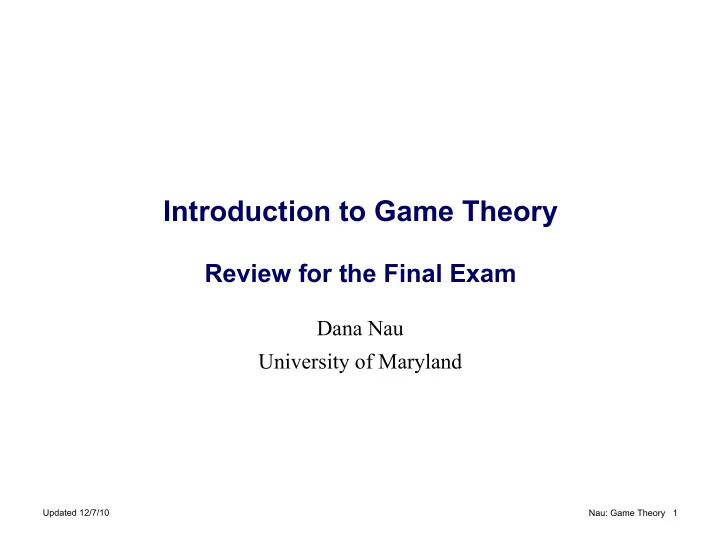

Introduction to Game Theory Review for the Final Exam Dana Nau University of Maryland Updated 12/7/10 Nau: Game Theory 1
1. Introduction Basic concepts: normal form, utilities/payoffs, pure strategies, mixed strategies How utilities relate to rational preferences (not in the book) Some classifications of games based on their payoffs Zero-sum • Roshambo, Matching Pennies Non-zero-sum • Chocolate Dilemma, Prisoner’s Dilemma, Battle of the Sexes, Which Side of the Road? Common-payoff • Which Side of the Road? Symmetric • all of the above except Battle of the Sexes Updated 12/7/10 Nau: Game Theory 2
2. Analyzing Normal-Form Games I’ve discussed several solution concepts, and ways of finding them: Pareto optimality • Prisoner’s Dilemma, Which Side of the Road best responses and Nash equilibria • Battle of the Sexes, Matching Pennies • finding Nash equilibria real-world examples • soccer penalty kicks • road networks (Braess’s Paradox) Updated 12/7/10 Nau: Game Theory 3
3. More about Normal-Form Games maximin and minimax strategies, and the Minimax Theorem Matching Pennies, Two-Finger Morra dominant strategies Prisoner’s Dilemma, Which Side of the Road, Matching Pennies Elimination of dominated strategies rationalizability the p -Beauty Contest correlated equilibrium Battle of the Sexes trembling-hand perfect equilibria epsilon-Nash equilibria evolutionarily stable strategies Hawk-Dove game Updated 12/7/10 Nau: Game Theory 4
4a. Extensive-Form Games Extensive-form games relation to normal-form games Nash equilibria subgame-perfect equilibria backward induction • The Centipede Game Updated 12/7/10 Nau: Game Theory 5
4b. Game-Tree Search Two-player perfect-information zero-sum games the Minimax theorem applies perfect-info => only need to look at pure strategies minimax game-tree search • minimax values, alpha-beta pruning In sufficiently complicated games, must compute approximations limited search depth, static evaluation function In games that are even more complicated, further approximation is needed Monte Carlo roll-outs Updated 12/7/10 Nau: Game Theory 6
4c. Lookahead Pathology Probability of correct decision, critical nodes examples (P-games and N-games) General results Pathology is more likely when branching factor is high, granularity is small, local similarity is low Kalah, chess Local pathologies Updated 12/7/10 Nau: Game Theory 7
5. Imperfect-Information Games Nodes partitioned into information sets Information set = {all the nodes you might be at} Behavioral strategies versus mixed strategies Different equilibria in general; same equilibria if there’s perfect recall Sequential equilibria Like subgame-perfect equilibria, but with forests rather than trees • Example (in the homework) but no definition Monte Carlo game-tree generation, state aggregation example: Bridge programs Information-set search compute a best response to opponent’s strategy paranoid and overconfident opponent models results in kriegspiel, P-games, N-games, kalah Brief discussion of poker Updated 12/7/10 Nau: Game Theory 8
6a. Repeated Games Finitely and infinitely repeated games iterations, stage games Roshambo, IPD, IPD with noise strategies for such games Differences between theoretical predictions and empirical results Examples: Roshambo Iterated Prisoner's Dilemma Noisy IPD Opponent modeling and noise filtering Updated 12/7/10 Nau: Game Theory 9
6b Stochastic Games Markov games states, transition probabilities, reward functions, strategies, and equilibria Two-player zero-sum stochastic games Backgammon expectiminimax Evolutionary simulation games replicator and imitate-the-better dynamics lottery games, state-dependent risk preferences Imitation dynamics Evolutionary stag hunt Updated 12/7/10 Nau: Game Theory 10
7a. Incomplete-Information Games Regret, maximum regret, minimax regret Bayesian games Didn’t give a definition, but discussed necessary conditions Example of reducing an incomplete-information game to an imperfect- information game uncertainty about payoffs Auctions, and equilibrium analysis of them English auction The “dollar auction” First-priced sealed-bid Dutch Second-priced sealed-bid Updated 12/7/10 Nau: Game Theory 11
7b Cultaptation Updated 12/7/10 Nau: Game Theory 12
8 Coalitional Games Transferable utility Voting game example Classes of coalitional games superadditive, additive, constant-sum, convex, simple, proper-simple, etc. Payoff sets, pre-imputation and imputation sets, Shapley value, etc. Core, stability Updated 12/7/10 Nau: Game Theory 13
Recommend
More recommend